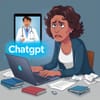In a surprising twist, many parents are starting to trust AI tools like ChatGPT more than traditional doctors when it comes to seeking advice about their children’s health. This trend reflects a growing reliance on technology for information, particularly as the landscape of healthcare continues to evolve.
Recent studies indicate that parents often turn to AI for quick answers to their health-related questions. The convenience and accessibility of platforms like ChatGPT allow parents to get immediate responses without the need for a lengthy wait in a doctor's office. In an age where time is precious, this instant access can be a game-changer.
However, it’s essential to recognize the benefits and limitations of relying on AI for medical advice. While AI can provide general information and suggestions, it lacks the nuanced understanding and personal touch that a trained healthcare professional offers. Parents should view these tools as supplements to, rather than replacements for, traditional medical care.
The growing trust in AI may also stem from its ability to provide tailored responses based on the specific questions posed. Parents appreciate the personalized approach that AI can deliver, helping them feel more informed and empowered in their decision-making process.
Still, it’s crucial for parents to maintain a balanced perspective. While AI can be a valuable resource, it should not substitute for professional medical advice, especially in serious situations. It’s always best to consult a healthcare provider for accurate diagnoses and treatment plans.
The challenge will be to integrate AI into the healthcare landscape in a way that complements traditional practices. By combining the strengths of technology with the expertise of medical professionals, we can create a more informed and efficient healthcare experience for everyone.


